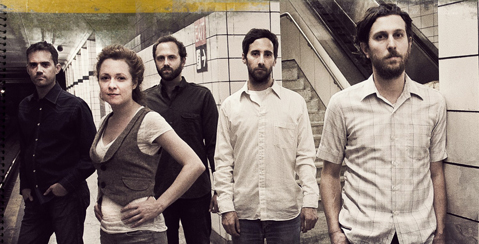Nothing traditional about Roots & Traditional Juno nominees Great Lake Swimmers
The Great Lake Swimmers have a strange habit. The Canadian folk-rockers have made it a tradition to record their albums in nontraditional places.
Nearly a decade ago, frontman, Tony Dekker, scouted out an abandoned grain silo to record the band’s haunting 2003 self-titled debut.
Then it was on to a lakeside church in rural southern Ontario, where the band completed their sophomore effort, Bodies and Minds.
The majority of the Swimmers’ third album, Ongiara, came together in Aeolian Hall, an 1884 heritage building in London, Ontario, and 2009’s Juno nominated and Polaris Prize shortlisted album, Lost Channels, was recorded in various places in the Thousand Islands, including the historic Singer Castle.
Now you’ll never guess where the Swimmers set up camp to record their Juno nominated fifth album, New Wild Everywhere.
Here’s a hint, the location was much more conventional. A place obvious to most musicians, while so obscure to the Great Lake Swimmers.
For the first time ever, the band chose to use [insert drum roll here] an actual recording studio.
“We were lucky enough to be one of the first bands to record at Revolution Recording,” says fiddler and vocalist Miranda Mulholland. “It’s a new, beautiful, spacious and incredible facility in Toronto with great gear, and run by lovely people.”
No matter how swell the experience was at Revolution Recording, New Wild Everywhere wouldn’t be a true Great Lake Swimmers album if the band didn’t capture their sound in at least one unlikely setting. And so the track, ‘The Great Exhale,’ was recorded in an abandoned subway station below the streets of downtown Toronto.

“Things got a little silly as we became deliriously tired. Here is a shot Erik took when we were goofing around between takes,” Miranda shares.
“There was a lot of red tape involved in getting us down there, and once we worked that out, there were more challenges,” Miranda explains.
Aside from lugging gear down the steep flights of stairs running underground, something else made recording a little tough.
“The Bay subway above runs until 1 a.m., so we had to record in the wee hours of the night to avoid the noise. We did this for three coffee-fueled nights,” Miranda remembers. “The version of ‘The Great Exhale’ was from those sessions, as recorded by us, the Nocturnal Subway Creatures.”
While it’s unknown if Miranda’s new name for the ensemble will float with her crew, one thing is sure, there’s nothing traditional about Roots & Traditional Juno nominees the Great Lake Swimmers, at least not when it comes to recording hit albums.
Watch the full broadcast of the 2013 Juno Awards at CTV.ca/junos
Follow the Great Lake Swimmers on twitter and facebook.













